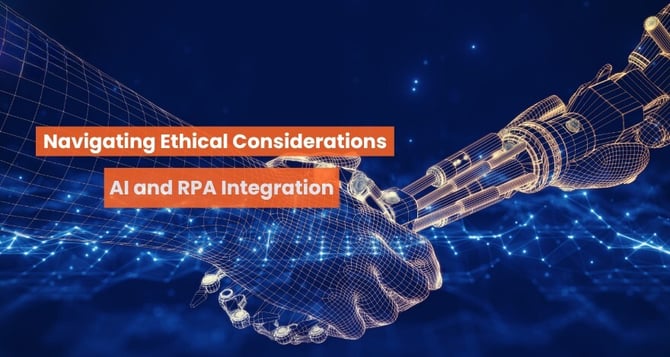Businesses are increasingly adopting operational automation, using the combined capabilities of Robotic Process Automation and Artificial Intelligence. These days, the question is not only “Can we automate the process using AI+RPA?” but also “Should we integrate AI+RPA?”
RPA provides fast responses on a large scale, while AI technologies add intelligence and optimized decision-making power to the process. AI and RPA integration services can improve efficiency, but increase privacy concerns and biased outcomes if ethical guidelines are not set.
Ensuring the responsible and ethical use of the tools has become very crucial. This blog explores the critical ethical practices and considerations for AI-RPA integration.
 Generate
Key Takeaways
Generating...
Generate
Key Takeaways
Generating...

- AI systems require sensitive data, so it is essential to ensure data regulations, constant monitoring, and restricted access to data.
- Human oversight is required for critical decision-making as AI systems can learn from biased data and impact the outcome.
- Accountability is compromised by black-box AI. Explainable and transparent models enhance user trust and reliability in the system.
Why Are Ethical Considerations Important For AI-RPA Integrations?
AI and RPA are not only working for automation; they are working together to make informed decisions. The integration of AI's cognitive capabilities with RPA's execution prowess creates systems that not only perform tasks but also make increasingly complex decisions.
In banking, for instance, AI-RPA systems now handle loan underwriting, fraud detection, and customer risk profiling—decisions that directly impact people's financial well-being. Applying robotic process automation in banking demonstrates such automation's tremendous potential and inherent risks.
The compounding effect of AI-RPA systems makes ethical standards particularly urgent. Unlike standalone automation, these integrated systems can amplify biases at machine speed, obscure decision-making pathways through layered algorithms, and create accountability vacuums where neither human nor machine assumes responsibility.
Ethical AI considerations are crucial for AI-RPA integrations to ensure responsible and beneficial technology deployment.
Top Ethical Concerns in AI-driven Automation
Organizations must carefully navigate the ethical issues raised by the integration of AI and RPA. As these technologies automate complex business processes, several critical ethical issues arise that need proactive handling and mitigating risks.
1. Data Privacy And Security
The data-intensive nature of AI-RPA solutions raises serious ethical concerns about security and privacy. These technologies usually necessitate access to numerous data sources within a company, which significantly increases the attack surface for potential data breaches. Furthermore, because RPA is automated, any security flaws or privacy infractions can quickly be reproduced throughout the system.
The following are specific topics of ethical concern:
- Data access controls that are appropriate for automated processes
- Safe management of private data
- Adherence to changing data privacy laws
- Customer data used ethically for AI training
How to mitigate this challenge
- To protect user data, use end-to-end encryption methods.
- Ensure data minimization and select and process the required data.
- Make sure sensitive information is accessible only by authorized personnel.
- Perform multi-factor authentication, regular audits, and continuous monitoring.
- Implement robust security measures and general data protection regulations.
- Create and test data breach response protocols regularly.
- Continuously evaluate and mitigate privacy risks.
2. Transparency and Explainability Gaps
Various transparency and explainability challenges can arise while integrating AI with RPA. RPA uses predefined rules that are easy to understand and audit; AI can add layers of complexity that can hide how decisions are made. This black box poses a fundamental ethical dilemma with consequences.
How to mitigate these risks
- Maintain extensive documentation of AI models, including training data, methodology, and recognized limits.
- Use model-agnostic explanation approaches such as LIME or SHAP to explain AI judgments that are understandable to humans.
- Creating user-friendly interfaces that enable users to comprehend and query AI-RPA systems' decision-making processes.
3. Algorithmic Bias and Ethical Challenges
One key concern when integrating AI with RPA is the possibility of algorithmic bias in automated decision-making. Biases in training data are frequently inherited and amplified by these algorithms, which can have adverse repercussions.
Robotic process automation (RPA) may make these biased conclusions quickly and on a large scale, which adds to the ethical challenge. Unless deliberately programmed to do otherwise, automated systems will consistently apply erroneous logic across thousands of transactions, unlike human decision-makers who may notice and correct for biases in individual circumstances.
How to Mitigate this
- To ensure representation across all demographics, use a variety of datasets while training AI models.
- Fairness criteria should be used throughout the development process, and frequent tests should be conducted to check for prejudice against protected traits.
- Apply strategies such as adversarial debiasing to detect and reduce possible biases proactively. This machine learning technique uses adversarial AI to continuously detect bias to train a predictive AI model to make fair decisions.
- Create diversified, interdisciplinary teams to design and manage AI-RPA systems, incorporating viewpoints to spot possible biases.
- Identify and resolve new biases through regular audits and continuous monitoring of intelligent automation systems.
4. The Impact on the Workforce and Society
AI-RPA systems' deployment presents significant ethical concerns concerning their wider societal consequences, especially with regard to the effects on the workforce. Although these technologies might enhance operational efficiency and remove complex tasks, they may also replace some jobs, posing ethical challenges for the companies that use them.
How to Mitigate this Concern
- Before the automation rollout, detailed analyses of potential workforce, customer, and societal consequences should be performed.
- Develop retraining programs for career path adjustments for employees affected by automation.
- Transparent communication regarding the automation process and its impact on their jobs should be maintained.
5. Human Oversight and Control
Maintaining human oversight in critical decision-making is essential while implementing AI + RPA integration. The final goal for automated AI systems should be to augment human capability instead of replacing humans.
How to Mitigate this Risk
- Ethical guidelines must ensure that human oversights are involved in the critical decision-making processes.
- We need well-defined governance policies that specify precisely when people should step in to review or override AI-RPA decisions, especially for high-risk situations. These thresholds should be based on the potential impact of each automated process.
- Organizations should conduct periodic reviews to ensure their human oversight approaches work.
Build Ethically Considered Systems with Signity
Ethical considerations have become the key factor in building successful AI solutions. Whether you are automating customer support chatbots or banking workflows, ensuring your product is scalable, adaptable, and risk-free is vital. Contacting an AI consulting company is a beneficial option to ensure fairness, accountability, and product security.
Future Proof Your Intelligent Solution
Get AI-RPA solutions that grow with your business
At Signity, we build solutions that are more than just automation systems. Our AI-RPA integration services ensure governance with ethical frameworks, secure design, development, and solution transparency. Our team of experts has years of experience in AI development services. They can help you build a strong and risk-free AI automation solution. Contact us today to get an estimate!
Frequently Asked Questions
Have a question in mind? We are here to answer. If you don’t see your question here, drop us a line at our contact page.
How do RPA and AI work together?
![]()
AI and RPA work together to provide intelligent Automation solutions. RPA automates repetitive and complex tasks, and AI adds decision-making capabilities.
What is the key advantage of integrating AI with RPA?
![]()
How can we ensure AI systems are bias-free?
![]()
To ensure the AI systems are bias-free, regular monitoring, using diverse data sets to train the AI model, and evaluating the final result based on various bias checks are some considerations.
How can we ensure data security while using AI-RPA together?
![]()
Establishing strict access controls to limit people from accessing private information, implementing data encryption methods, proactive monitoring, and centralized credential management can ensure data security in AI-RPA integrated systems.


%201-1.webp?width=148&height=74&name=our%20work%20(2)%201-1.webp)


.png?width=344&height=101&name=Mask%20group%20(5).png)









.png?width=352&name=What%20is%20the%20Difference%20Between%20AI%20and%20Automation%20(1).png)








